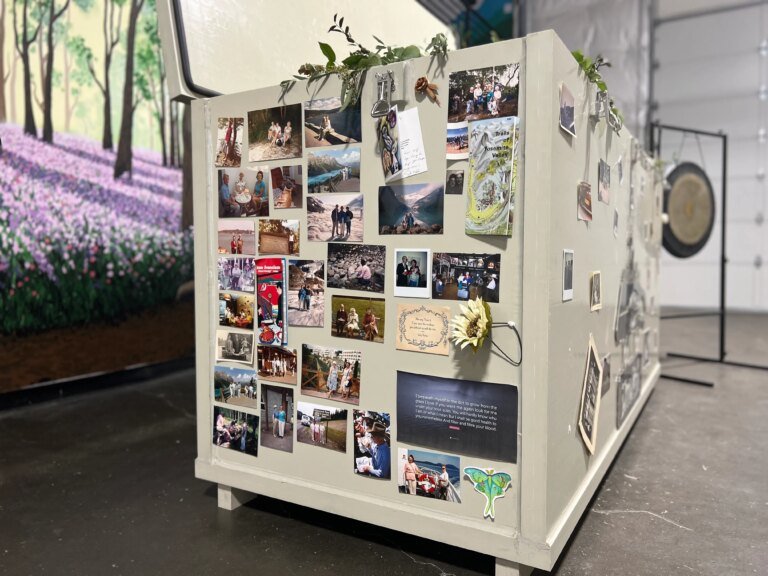Do you know what want to have happen to your body after you die? Do you want to be cremated, buried, or given an epic Viking burial?
While it may seem macabre, it’s important to think about so our loved ones don’t have to while their in the throes of grief. On this episode of Ask Us Anything, editors Sarah Durn and Annie Colbert dig into a novel way people are choosing to handle their bodies after they die: human composting. The process turns human remains into about 250 pounds of nutrient rich soil that loved ones can use in their gardens or scatter about a forest.
Ask Us Anything answers your most outlandish, mind-burning questions—from the everyday things you’ve always wondered to the bizarre things you never thought to ask. So while you can’t chuck garbage into the sun, you can (and should) sleep more in the winter. If you have a question for us, send us a note. Nothing is too silly or simple.
This episode is based on the Popular Science article “How human composting turns bodies into soil.”
Subscribe to Ask Us Anything
Listen and follow Ask Us Anything on your favorite podcast platform:
Spotify | Apple Podcasts | YouTube | Or wherever you get your podcasts.
Full Episode Transcript
Sarah Durn: After you die, what do you want to happen to your body?
Person 1: Bodies take up a lot of space and it’s really strange to think about it just sitting there after, I guess, I don’t know. I don’t wanna think about it. I try not to.
Person 2: I don’t think I wanna be cremated, but I would love to have just like a simple wood coffin that you can decompose with and return to dust, you know?
Person 3: I would like to be cremated and then have my ashes buried in a green burial plot. The plot that my father was buried in is in the mountains. It’s beautiful.
Person 4: So I’ve always just wanted to be buried as minimally as possible, so I decompose really quickly. Maybe I become worm food. Maybe I grow into a tree. Just kind of, you know, move on.
SD: Welcome to Ask Us Anything from the editors of Popular Science, where we answer your questions about our weird world from “Why cats actually hate water” to “Can you drink raw milk?” No question is too outlandish or mundane. I’m Sarah Durn, an editor at Popular Science.
Annie Colbert: And I’m Annie Colbert, Editor-in-Chief at Popular Science.
SD: Here at Popular Science, we’re always asking bizarro questions. We can’t help it. We’re perpetually curious in the office.
AC: We cannot help it. And this week our curiosity has led us to human composting. Something Sarah just edited a piece on. So Sarah, what is human composting and how does it work?
SD: Yeah, so human composting is basically a way to turn a human body into soil after you die. It’s a natural, environmentally friendly process that first became legal here in the U.S. in Washington state in 2019. Since then, human composting has been slowly gaining traction and is now legal in 14 states. This story was actually something you brought to my attention, Annie. How did you first hear about human composting?
AC: Okay, this might sound strange, but do you remember the show Six Feet Under on HBO?
SD: I never saw it, but I do remember it.
AC: Okay. It aired in the early 2000s and it’s about a family that runs a funeral home. It’s phenomenal and no spoilers 20 years later, but one of the main characters dies and requests a green burial, and he’s in this burlap sack and his family is throwing his body in a hole, and it’s very moving and memorable as an episode. And that was the first time I remember thinking about a modern burial that wasn’t just a traditional burial or a cremation.
SD: Is it something you’ve at all considered?
AC: I’m definitely intrigued by the idea and like the thought of becoming soil and, you know, I know from experience how important it is to think about your funeral plans, even if you’re uncomfortable, just so your family doesn’t end up carrying that burden while they’re dealing with their grief.
But honestly, I don’t know. It’s definitely something I need to think about a little bit more.
SD: Yeah, I mean, that is totally fair. We’ll check in with you after we dive in. Well, it’s definitely something I am considering after editing this story. It kind of seems like the green alternative to cremation.
AC: Totally.
SD: You know, and just instead of ashes your loved ones get… soil.
AC: Absolutely. Now, before we dive deep into the compost pile, we wanna know what questions are keeping you curious. If there’s something you’ve been dying to know, either literally or figuratively, submit your questions through popsci.com/ask.
SD: We can’t wait to hear all your ideas.
AC: Up next, we’re gonna dive into the nitty gritty details of what actually happens to your loved one’s body when they opt for human composting. That’s coming up after this quick break.
Welcome back. Now let’s talk human composting. So human composting, or as the fancy folks call it natural organic reduction, or terramation, is actually a centuries old idea that’s gotten a modern eco-friendly upgrade. Currently, it’s legal in 14 states in the U.S. with New Jersey being the most recent edition, just this year in September 2025. Good job, New Jersey.
Basically, instead of being buried or cremated, your body can literally return to the earth as soil. Alright, Sarah, I think most of us have a general idea about how composting works with fruits and vegetables or egg shells, coffee grounds, but how does human composting work? How do we go from a living, breathing body to soil in the ground?
SD: So, yeah, let’s break it down. The first step is to find a funeral home that offers human composting, which can be tricky since this is so new, as you pointed out. For our story, writer Jennifer Byrne talked with funeral director Brienna Smith, the Chief Operating Officer of Return Home Green Funeral Home in Seattle. Return Home opened in 2020, the same year that Washington State first made human composting legal.
AC: Nice. They got right on it.
SD: They did.
AC: So, Sarah, how does the process work at Return Home?
SD: Yeah, so first the body is prepared. It’s washed with essential oils. The hair gets clean, the eyes and mouth are closed, and then the body is dressed in a compostable garment. At Return Home these garments are actually made by Smith’s mother, Kim Yarger, who calls the smocks “Terra Couture.” That’s right, your final outfit could be eco chic.
AC: That’s incredible. I love that this is like a whole family operation.
SD: I know. It’s so cute. So then the body goes into a polycarbonate vessel, basically a giant rectangular box, about eight feet long, three and a half feet wide, and three and a half feet tall. Think, you know, basically a casket. Families can then even have a laying in ceremony where they decorate the vessel with mementos before the process begins.
AC: Oh, nice. So like with flowers and photos and trinkets.
SD: Yeah, totally.
AC: That’s really sweet. Is that the funeral?
SD: It can be, or it can be a separate ceremony, whatever the family decides.
AC: Gotcha. That’s really beautiful actually.
SD: I know. Yeah, if you look at our story on the Popular Science website, which I’ll drop in the show notes, you can see a photo of one of these decorated vessels and they’re really beautiful.

AC: So what’s in this vessel, other than grandpa?
SD: Yeah, so the vessel is filled with a mixture of straw, alfalfa, and sawdust. The straw insulates, the alfalfa adds nitrogen to help fuel tiny microorganisms, also called microbes that process the body, and the sawdust soaks up extra moisture. Right away, those microbes get to work, breaking down the body.
AC: Does it, you know, smell?
SD: It actually doesn’t, thanks to that careful mix of straw, alfalfa, sawdust, and a controlled airflow. The whole process is pretty odorless. In fact, families often visit the vessel during the decomposition process.
AC: Oh, that’s nice.
SD: Yeah, it is. Another key part of this stage of the process is temperature. State regulations require these vessels to hit at least 131 degrees Fahrenheit for 72 hours. This helps speed up the process and ensures that grandpa doesn’t release any dangerous bacteria or diseases or, you know, the reason why we don’t want dead bodies around.
AC: Yes. Very important.
SD: About midway through the process, the return home staff will gently turn the vessel to redistribute the contents and reintroduce oxygen to keep decomposition even. They actually use a special machine to do this.
AC: So it’s like a really slow, very specific garden recipe…just with a human ingredient.
SD: Yeah, exactly. By the end of about 60 to 90 days, you’re left with roughly 250 pounds of nutrient rich soil.
AC: 250 pounds!
SD: I know. It’s a lot!
AC: It’s a lot!
SD: I also don’t know if it varies depending on the person. I mean, I assume it does. And yeah, and then families can take it all or just take a smaller urn-sized portion, totally up to them. And if there’s leftover soil, it then gets donated to a local green belt or a woodland area.
AC: Hmm. But what happens if, say, grandpa had a hip replacement or a pacemaker? Do those things decompose too?
SD: Yeah, great question. At Return Home, inorganic materials, like say a medical device actually get removed during the final stage of the process. Those items are then recycled or disposed of separately. So your pacemaker isn’t part of your tomato garden.
AC: Gotcha. Good to know. So grandpa could be out there helping the tulips bloom in just a few months.
SD: Yeah, totally. It’s all kind of poetic, if you think about it. Your life literally nourishing new life. And for people who’ve spent their lives caring about the environment, it’s a way for their death to align with the way they lived.
AC: Yeah, absolutely. It’s all surprisingly uplifting. Composting: It’s the ultimate zero waste life hack.
SD: Totally.
AC: Yeah, right. You know, I feel like I’ve learned a lot from today’s episode, and now I have a lot to keep thinking about.
SD: Oh yeah. That’s great to hear. We have to take a super quick break, but when we get back, I want to know what are your thoughts on human composting are now, Annie?
So Annie, what are your thoughts on human composting now?
AC: You know, after hearing all the details, I actually think I’m more into it than I thought. Being part of a garden, I think that’s something really lovely. And I think there’s something really wonderful about leaving something living for your family after you die.
My dad died about three years ago at this point, and someone gifted my family, you know, people send flowers, and they had sent three orchids to myself and my siblings, and I have two siblings, so there’s three of us. So each of us took an orchid and we named the orchids after the person who gave it to us. So they were called Mike, and my brother and sister have done a wonderful job keeping them alive. And it’s like this lovely thing that we have in our group text where we say like, how’s your Mike plant doing?
SD: Aw.
AC: And I have to admit that mine died very quickly after, which my dad would’ve found very funny.
SD: Orchids are hard.
AC: They’re very hard. My brother and sister’s are thriving.
But it’s really comforting. It’s sort of this nice thing that we had after my dad passed of these very hard to take care of orchids that remind us of him.
SD: Oh, that’s really sweet. So if you did go the human composting route, what would you want to happen to the soil?
AC: So I asked my 8-year-old this. I told her that we were talking about this today, and she got really excited. She’s like, I would want the giant pile of dirt because I told her how much dirt it could be. And she said that she would plant flowers in me and add googly eyes to the flowers because she thought it would be funny.
SD: Awww.
AC: And then, you know, as I thought about it, I think I would love for it to be placed somewhere where people just go to kind of space out and chill. The idea of your compost soil being in like on the side of a highway seems a little bit sad, but being somewhere, you know, near a lake or in a forest seems very pleasant.
SD: Yeah. Would you wanna become a specific plant?
AC: You know, we did a story earlier this summer about chaos gardening, and that very much speaks to me as a person who killed my orchid and often kills other plants. And so the idea of just chucking a bunch of seeds into my soil pile and hoping for the best, it really, it feels like me. How about you?
SD: Yeah, you know, I wouldn’t wanna be part of anyone’s garden because honestly, I wouldn’t want anyone to stress out that they killed the plant that I became.
AC: That’s a very good point. A very good point.
SD: Right? Like the Mike orchid. I feel nervous already putting that on people. So I just want people to spread my soil somewhere they have fond memories with me and let nature do her thing with it, and hopefully her thing involves me becoming a willow tree.
AC: Oh, a willow tree. That’s a good one.
SD: Yeah. I just think they’re beautiful and I like the Whomping Willow in Harry Potter.
AC: I love it.
SD: And that’s it for this episode, but don’t worry, we’ll have another Ask Us Anything episode for you in just two weeks. We’ll answer the question of “what actually happens to your checked bag after it disappears down the conveyor belt?” For that and so much more, follow or subscribe to Ask Us Anything by Popular Science wherever you enjoy podcasts. And if you like our show, please leave a rating and a review.
AC: We want to hear your thoughts. We really do.
SD: We do.
AC: We do. Our theme music was composed by Kenneth Michael Reagan, and our producer is Alan Haburchak. This week’s episode was based on an article written for Popular Science by Jennifer Byrne.
SD: Thank you team, and thanks to everyone listening
AC: And one more time: If you have a question that’s been tickling your brain and you want it explained on a future episode, go to popsci.com/ask. Until next time, stay curious and keep the questions coming.



